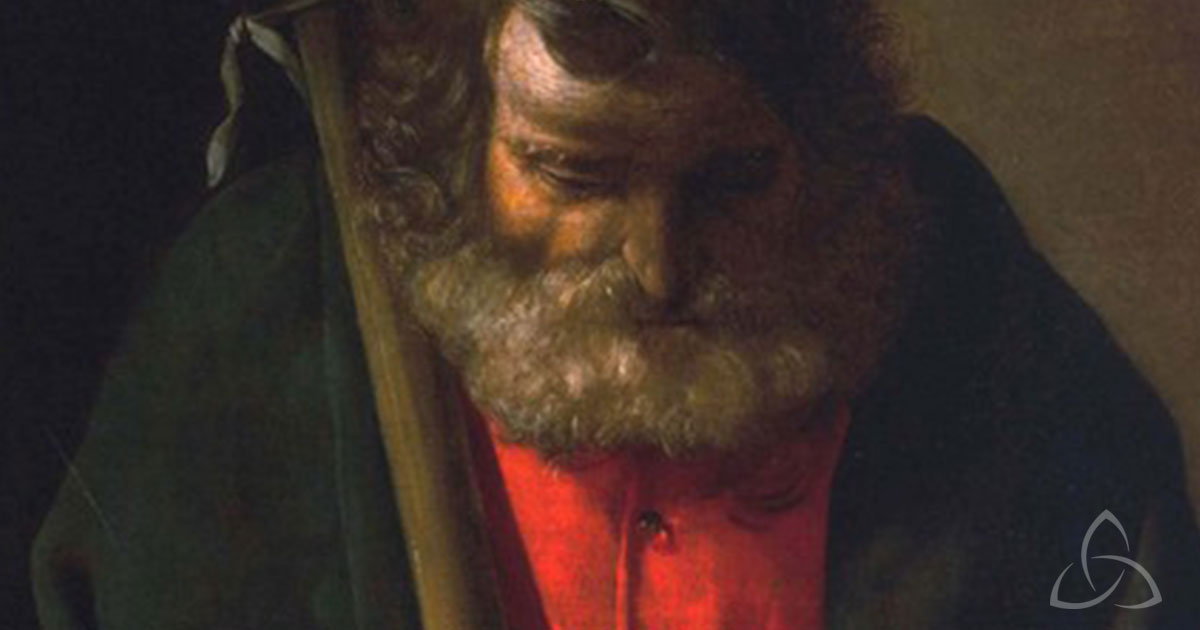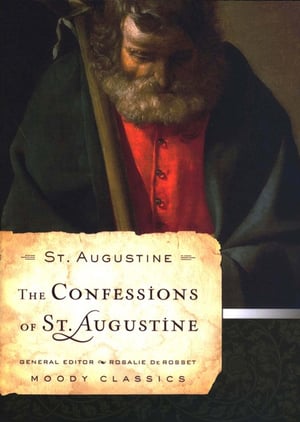
 Several weeks ago Ray preached on “finding your story”. Last week I preached on “sharing your testimony”. At home I have been reading On the Road With Saint Augustine by James K.A. Smith, and I thought he perfectly brought together and summarized both sermons. In 400 A.D. Augustine penned his book Confessions. It was his testimony, his story about what God had done in his life. Here is what Smith says about story, the Scriptures, and our longing for identity based on the life of Saint Augustine:
Several weeks ago Ray preached on “finding your story”. Last week I preached on “sharing your testimony”. At home I have been reading On the Road With Saint Augustine by James K.A. Smith, and I thought he perfectly brought together and summarized both sermons. In 400 A.D. Augustine penned his book Confessions. It was his testimony, his story about what God had done in his life. Here is what Smith says about story, the Scriptures, and our longing for identity based on the life of Saint Augustine:
One of the obstacles that novelist Leslie Jamison had to overcome on the road out of addiction was the peculiar way stories function in recovery groups. For the novelist, of course, the burden is to be original: to tell the story that’s never been told, the one that makes a new world, discloses something we’ve never seen before. It’s why the anxiety of influence hangs over the artist’s aspiration: to make something new as if you had no influences, no debts, no history.
But in Alcoholics Anonymous, she noticed that the “addiction stories” traded back and forth as the oxygen of the group all made you think, “I’ve heard this before” because “addiction is always a story that has already been told.” It’s why every book on addiction and recovery seemed like the same book (I’ve already read that book, the glazed eyes of others told her). So why write another?
It took Jamison a while to realize that stories function differently for such a community. The point of a story isn’t originality or ingenuity; that would make the story really about the storyteller. “Look at me” is the secret desire of originality. But the stories that circulated in a recovery meeting served a different end: they were weaving a web of solidarity.The point wasn’t to draw attention to the storyteller; the hope was to give a gift to the listeners, to recreate a world in which listeners could see themselves, orient themselves, and maybe even see a way forward, a way out. “In recovery,” she recalls, “I found a community that resisted what I’d always been told about stories—that they had to be unique—suggesting instead that a story was most useful when it wasn’t unique at all, when it understood itself as something that had been lived before and would be lived again. Our stories were valuable because of this redundancy, not despite it.” What is meant to be damning in the review of a book (just another addiction memoir) “gets turned on its head by recovery—where a story’s sameness is precisely why it should be told. Your story is only useful because others have lived it and will live it again.”
But why would I listen to the stories of this motley crew in a church basement who’ve never seen me before and know nothing of my own story? What makes their stories matter?
A therapist gave Jamison a concept to name how these stories function: witness authority. This is the authority you accord someone who knows the trouble you’ve seen, who garners authorial attention from you because they’ve walked in your shoes. And when they tell their story, it’s like they’ve been reading your mail. Addiction stories work because of this solidarity of experience. Jamison recalls what her friend Dana whispered at her first meeting, upon hearing someone else’s story: “’That’s me,’ as if their whole life had been spent listening to the wrong radio station.”
To find ourselves in someone’s story—to feel known by the witness of another—is not unique to addicts, surely. Rather, the brokenness of addiction only distills what is a human hunger: to be known, to find a place to be given a story that gives us bearings, as sense of identity that comes from solidarity. I’ve found my people,” we say when we discover a community that shares with us what we thought was a solitary passion or alienating affliction. Despite all the ways we’ve been schooled in expressive individualism, we are all more aware of the dynamics of identity, of finding ourselves in relation to some group that gives us meaning, significance, a cause. Identity is a characterization to which we accede because the group comes with a story that makes us a character, gives us a role to play. Someone bears witness to what it means to be them, and we whisper, “That’s me”. Identity is our name for being found by a story someone else told.
Why should we care about Augustine’s story? Why listen? This is a question he wrestled with explicitly. And his only appeal—his only claim to authority—is witness authority. Augustine recognizes that he can’t prove anything: “I can’t prove to them that what I confess is the truth.” He’s not offering a demonstration that marshals evidence to prove a conclusion. He’s not trying to argue anyone into his story. Instead, he shares a story that he invites his readers to “try on” and see if it might perhaps fit their own experience. Why write these confessions to God “in such a way that other people can hear?” he muses. If I’m just confessing to God, why not keep a journal, work all of this out in private? Well, for the same reason that addicts share their story at a meeting: maybe someone will see themselves in my story, Augustine says. Maybe someone will hear this prodigal tale, with all its dead ends and heartbreak, and whisper, “That’s me.” And maybe if they can see themselves in God’s story as the one making their way home, being gathered up by a father who runs out to meet them and throws a feast. Augustine’s story is only of interest if it is unoriginal, a story that’s been told a million times, one that rehearses the prodigal adventure of the human condition.
He pleads with God: “Make clear to me what the advantage is of my testimony.” Why risk satisfying all the haters who will chalk this up to my vanity? Why give fodder to the ancient African TMZ station so eager to get its hands on dirt about the bishop of Hippo? His response: “When the confessions of my past wrongdoings—which you forgave and hid so that you could make me happy in yourself, changing my soul with faith and your rite of baptism—are read and heard, they arouse the heart out of its sleep of despair, in which it says ‘I can’t.’” It’s all worth it, Augustine says, if someone despairing might find herself in my story and imagines she could be otherwise—imagines that grace could irrupt in her life too. Someone might hear my story, Augustine hopes, and see in my past a familiar stretch of road. They might hear me describing my misadventures and anxiety and be able to say, “I’ve been down that road”—which means they might also be able to see a way out, a way forward, a way home. I write for others, he says, as “partners in my joy and sharers in my mortality, my fellow citizens and sojourners abroad with me”—so they might find compatriots of a patria they didn’t know they were longing for. If in my past they can see themselves (“That’s me”), perhaps in my present they might be able to imagine: “That could be me.” The despair of “I can’t” is invited into the story Augustine shares: “You can.”
This is why the Confessions should never be confused with a memoir or an autobiography. If Augustine shares his story, it’s not to disclose something about himself. To the contrary, there’s a sense in which his own particularity is diminished, his biography eclipsed. The point is to share a story that is “generic” enough for any and all to be able to imagine themselves in it. In that sense, his story is not unlike the addicts ‘stories in recovery: Dave and Arlene aren’t sharing their stories so you can get to know them; they’re sharing their stories so you can get to know yourself. Their story discloses something about you. It’s meant to help you face up to yourself. What the Confessions ask of a reader is not, “What do you think of Augustine?” but rather, “Who do you think you are?” Augustine is writing to get readers to respond not to him but to God. Jean-Luc Marion, in his philosophical study of Augustine, discerns this better than anyone: “The readers do not have to respond to the author about their literary enjoyment, nor about their psychological sympathy, but to God about their own confessing affectus,” their own desire. “The response asked for by the author does not ask of the reader that he or she respond to the author (for example, to pity him, to approve him, to acquit him to admire him, etc.) but to respond directly to what God asks.” The Confessions, Marion suggests, are really “a machine to make a confession made by each of its readers by inciting in them the human intellectus and affectus for God.” Augustine’s story is a tool, a machine, that—like everything else in creation—is to be used in order to enjoy God.
This is not a stern demand, as if God were standing there, arms crossed, scowling, waiting for an answer. Rather, the story is meant as an invitation to see oneself in a new frame, as a “character” in a very different story— “to see oneself as God alone sees us: as loveable, however deformed we might have let ourselves become.” The Confessions, far from being an egocentric memoir or autobiography (like those penned by Montaigne and Rousseau), are “a hetero-biography”, as Marion puts it, “my life told by me and especially to me from the point of view of an other (hetero), from a privileged other, God.” Augustine’s story is the story that was given to him by the grace of God, an identity in which he found himself, and he tells his story for others with the same hope: that they might find themselves in the story God has to tell about them as his children, his friends, his beloved—as those for whom he is willing to lay down his life.
In the Confessions, but also in the preaching that would occupy the rest of his life, Augustine constantly invites fellow sojourners, sisters and brothers in the human condition, to try on a story they might not have considered, the story that they are made for more than the mundane, that they have hungers no thing can satisfy, that they are loved by the One who made them, that there is a home that’s already been made for them, that the God of the universe knows everything about them and still loves them and is waiting to welcome them home with scars on his outstretched hands. “That can’t be me,” we might at first protest. It’s too fantastical, too unbelievable. It might even offend our need to earn God’s love or prove ourselves. “I know what you mean”, we can almost hear Augustine saying. “I’ve been there. What if I told you that you can be released even from that? Would that be the secret you’ve been hoping is true? Welcome to a story you’ve imagined. I’m here to tell you it’s true.”
Our longing for an identity is bound up with finding a story…The book that would finally arrest [Augustine’s] search for a story was the Bible. The script that would finally guide his way was the Scriptures. As Brian Stock notes in his magisterial study Augustine the Reader, Augustine realized that identity was storied, and that meant finding your story in the story revealed by your Creator…What was it about the biblical story that “fit”? What was it that this particular story became the governing narrative for the rest of his life?
The very notion will scandalize us, we who’ve been encouraged to live “our” truth, to come up with our own story, for whom authenticity is the burden of writing down our own de novo script. The notion of a governing narrative that is not your own feels like signing over the rights to your life – which it is! But for Augustine, being enfolded in God’s story in Scripture was not an imposition but a liberation. When you’ve realized that you don’t even know yourself, that you’re an enigma to yourself, and when you keep looking inward only to find an unplumbable depth of mystery and secrets and parts of yourself that are loathsome, then Scripture isn’t received as a list of commands: instead, it breaks into your life as a light from outside that shows you the infinite God who loves you at the bottom of the abyss. God’s Word for Augustine wasn’t experienced as a burden or a buzzkill but as autobiography written by God who made him. Scripture irrupted in Augustine’s life as revelation, the story about himself told by another, and as illumination, shining a light that helped him finally understand his hungers and faults and hopes.
…Augustine knows that the heart traffics in stories, that the lingua franca of love is more like poetry than logic. It’s a song that takes you home. And so he pens his Confessions to “prevent their heart[s] from sinking into the sleep of despair and saying, ‘It is beyond my power.’” Don’t despair, Augustine pleads; listen to my story. If even someone like me can find grace, you can too.
…In Augustine’s experience, the Word was like an enchanted map. It not only told him, “You Are Here” and pointed him toward home; it also gave him legs to run.
These Stories on Quarantine

4221 W. Gulf to Lake Hwy
Lecanto, FL 34461
Phone: (352) 746-6200
Fax: (352) 746-6299
Email: info@sevenrivers.org
Office Hours:
M-F: 8:30 AM - 4:30 PM